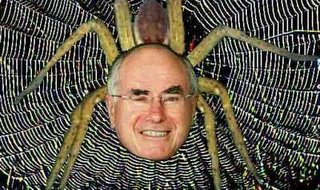what a tangled web they weave

The British high court has ruled that David Hicks be granted a British passport as soon as possible. This decision won’t be welcomed by the British Home Office, which initially denied citizenship to Hicks. My own feeling is that the British government will appeal the decision and will do whatever they can to block Hicks’ release.
The Australian government’s line is that this is all a matter for the British and they won’t be pressuring the Brits in any way. I don’t particularly trust our government in this (or any other) matter, but I don’t see how they could’ve reacted in any other way. It’s true that if Hicks was released to the Brits (where, I presume, he would not be able to be charged with anything under British law, any more than he would be able to be charged with anything under Australian law) it would further undermine the credibility of our government’s acceptance of what no other nation in the world accepts (including the US for its own citizens), namely the military tribunals set up to establish the guilt of its soi-disant enemies.
Young Master Downer is now criticising Labor for breaking away from bipartisanship on the issue. While I don’t think it’s true that Labor has been as happy with the military tribunal outrage as the government has, they certainly haven’t been as outspoken or fulsome in their criticism as has been warranted, so it does seem that they’ll just get into it for political gain, to try to make them squirm, as they did with their nasty and cheap remarks against poor Oday Adnan Al Tekriti. Obviously Labor don’t think there’s much mileage in being supportive of Hicks, or, it seems, even in jumping up and down about lack of due process.
I’m not sure where this is going to leave Hicks, in terms of being reunited with his family and his child. He will have dual citizenship, I believe. I hope that, if he is released to the Brits, he applies to come to Australia.
Two comments by our dear revered leaders on the case which is ‘sub judicae’ at the moment, if you can call it that, but that doesn’t stop our dear leaders from commenting negatively on the accused. Downer says that he’s charged with attempted murder and that this is a very serious offence, and so he should be tried, and if acquitted, so be it.
Now I’ve had personal experience of being charged with a very serious offence. You don’t need to have done anything wrong for this to happen. Hicks’ defence team have dismissed the charge as completely ludicrous, the British high court has been scathing about the military tribunal that has laid this and other charges against Hicks, and every nation, apart from Australia, which has had its citizens held at Gitmo and thus potentially subject to this military tribunal, has scrambled to get those citizens back home. I can think of no quasi-legal tribunal in my lifetime that has been so roundly and globally condemned as this one has.
John Howard has stated, too, that Hicks should be tried in the USA. He has voiced concern that, were he released to Britain or Australia, he would not be able to be tried for anything, for, as he claims, Hicks had not broken any Australian law at the time.
This is interesting when you recall that Hicks has been charged with attempted murder by the US military tribunal. Presumably this alleged attempted murder occurred over four years ago, when Hicks was in Afghanistan, and presumably the US authorities will have gathered sufficient evidence on this matter to lay the charge. If this is so, surely ‘bringing Hicks to justice’ would simply be a matter of handing over the damning evidence to whichever country, if any, Hicks is transferred to. After all, attempted murder is attempted murder, and the laws dealing with such serious offences would be substantially the same in all Western nations.
So, how can Downer, on the one hand, be making tut tut remarks about the serious offences Hicks is supposed to have committed, while Howard is at the same time making tut tut remarks about not being able to try him since he’d done nothing illegal under Australian law four years ago? Have Australian laws re attempted murder changed in the past four years? I don’t think so.
We all know what’s going on here, don’t we? I hope so.
Howard also pointed out that Hicks went back to Afghanistan in the immediate aftermath of the September 11 attack. He gave this great emphasis. Why? Surely Hicks was free to go in any direction he wanted in the immediate aftermath of September 11? I seem to recall, I think from a letter later written by Hicks, that he returned to Afghanistan, from just outside it, to recover his possessions, all his worldly goods, including a few knick-knacks he was quite proud of, and that he then became stranded there. This accords with what I’ve learned from various accounts and articles of Hicks’ unworldliness. It’s an unworldliness you’d think would appeal to people in the US, since most Americans believe that the September 11 attacks were carried out by Iraqis.
In short, I find it highly likely that Hicks didn’t make an immediate connection between Afghanistan and the events of September 11. I find it highly likely that Hicks wasn’t good at making connections in general. A bit like most Americans, only they aren’t paying anything like the price he’s paying for this sort of ignorance.
Hicks isn’t the sort of character I would normally sympathise with, but the use made of him by two illiberal governments is obscene.


0 Comments:
Post a Comment
Subscribe to Post Comments [Atom]
<< Home